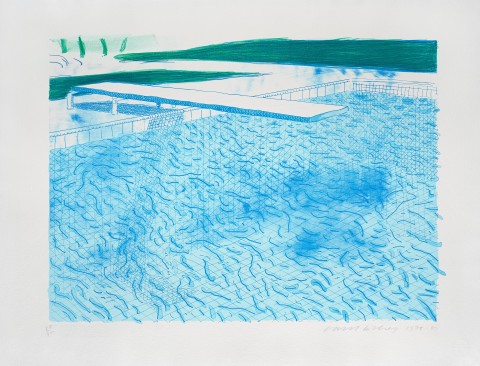LITHOGRAPH OF WATER MADE OF LINES WITH TWO LIGHT BLUE WASHES, 1978 – 80
DAVID HOCKNEY
lithograph in five colours on TGL handmade paper, with full margins
66.0 x 87.5 cm
signed and dated lower right: David Hockney 1978-80
numbered lower left: 28/35
Tyler Graphics chop mark lower right
workshop number inscribed lower left verso: DH78-474
Published by Tyler Graphics, Ltd., Bedford, New York
Rex Irwin Art Dealer, Sydney
Private collection, Bangkok, acquired from the above
Tyler, K., Tyler Graphics Catalogue Raisonné, Walker Art Center, Minneapolis, USA, 1987, (first edition), cat. 249:DH36, p. 167 (illus.)
The name David Hockney is today synonymous with vibrant, sun-drenched Matissean images of Californian swimming pools and Beverly Hills architecture. Establishing his early reputation with seminal Pop Art paintings such as The Splash, 1966 (private collection), Peter Getting out of Nick’s Pool, 1966 (Walker Art Gallery, Liverpool), A Bigger Splash, 1967 (Tate Britain, UK) and Portrait of an Artist (Pool with Two Figures), 1972, the suburban backyard pool of Los Angeles became a recurring motif in Hockney’s oeuvre, its water suiting the artist’s predilection for arrested movement and the illusion of surface transparency. A natural draughtsman, Hockney’s love of line and career-defining quest to represent moving water led him to the medium of lithography and a three-month long collaboration in New York State between August - October 1978 at the home of Kenneth E. Tyler, the master printer with whom Hockney had already worked at Gemini GEL.1 Hockney later recalled: ‘Ken had a swimming pool in the garden and every day we would have lunch by the swimming pool, every lunch-time I would have a swim. I kept looking at the swimming pool; and it's a wonderful subject, water, the light on the water [...] here, this pool, every time that you look at the surface, you look through it, you look under it.’2
This extended residency produced a suite of experimental painted paper-pulp unique works collectively known as Paper Pools, and an accompanying suite of editioned lithographs of the same subjects, several following a format of theme-and-variation, completed in full two years later in 1980. Hockney found a pleasing reciprocity in the depiction of aquatic subjects with such a water-heavy mechanical process.3 Eleven of these lithographs show the same view of a corner of Ken’s pool, each with a slight variation in the subtle hues of shimmering light on the water’s surface. These variations were recorded by Hockney with different combinations of coloured washes and gestural marks applied free-hand, and clearly detailed in the titles of each print. Lithograph of Water Made of Lines with Two Light Blue Washes, is one such impression from this suite of works, radiant with an inviting pale azure body of water, surrounded by saturated greenery around the water’s edge.
Abandoning himself entirely to these new experimental methods of art making and inventive mark-making, Hockney’s Paper Pools works radiate with enthusiasm and immediate spontaneity. Printmaking provided a welcome release for the artist’s imagination, and his stay at Tyler’s studio would be the longest made by any of the artists of his stable.4 Lithograph of Water, with its static architectural structure juxtaposed against a plane of the water’s moving surface, presented the perfect arrangement through which the artist could play with his favourite notions of surface and transparency. Here he uses colour washes and different densities of lines and cross-hatched shadows to illustrate the architectural framework, the shadows produced by strong sunlight and rippling effects on the surface of the water. Hockney then superimposes and concertinas these separate planes into one flat image, revelling in the tensions produced between “looking at”, “looking on” and “looking through” the backyard pool.
1. The National Gallery of Australia remarkably conserves in its permanent collection the largest holdings of works produced from Tyler Graphics in their Kenneth E. Tyler Collection
2. Hockney, D., ‘Making Paper Pools’, in Stangos, N., Paper Pools, Thames and Hudson, London, 1980, p. 21
3. Stangos, N., ibid., p. 7
4. Armstrong, E., ‘ Pop, Post-Pop and Beyond’ in Tyler Graphics: The Extended Image, Walker Art Centre, Minneapolis, 1987 p. 150
LUCIE REEVES-SMITH
